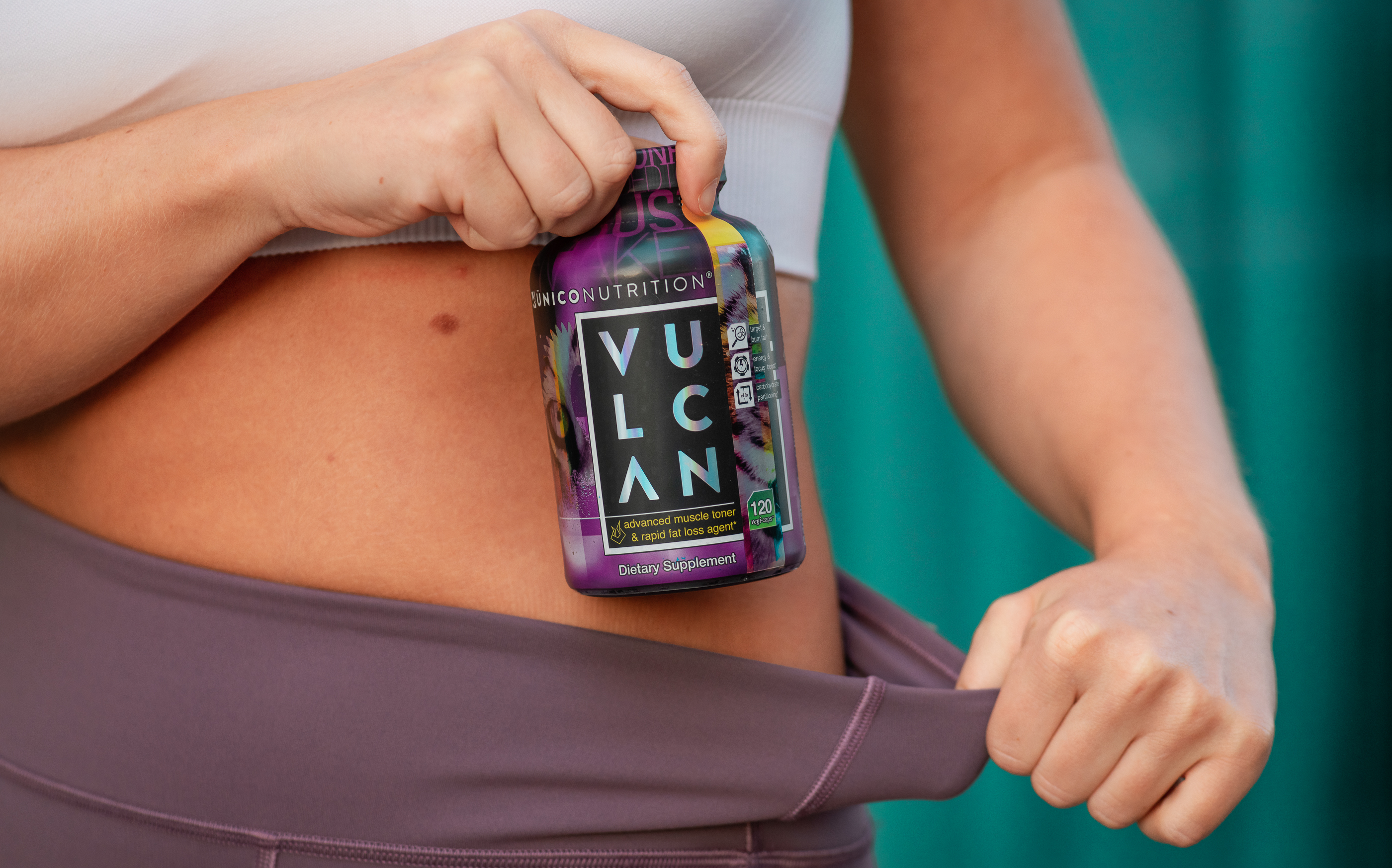Anyone and everyone who is trying to lose weight isn’t just trying to lose weight—they’re trying to lose it quickly.
But what most dieters don’t know is that there are limits to how much weight you can lose in a given amount of time.

In this post we’ll explore whether losing weight quickly is really the best, or whether a slower path leads to a more effective and sustainable outcome.
Look I get it.
If you’re trying to lose weight or thinking about it, these are the type of questions that have likely been swirling in your mind.
At my private practice we have helped hundreds of clients through the exact same thing.
So don’t stress! I’ll share some of my findings and help you make a weight loss plan that is both effective, sustainable, and healthy.
What Is Weight Loss?
Okay this is obviously a very simple question, but an important one in order to understand the limits on weight loss.
Consider this – one pound of fat is 3500 calories.
And a caloric deficit— or consuming fewer calories than your body burns in a given day—is the only way your body loses fat.
So in order to lose one pound of fat, you would need to eat 3500 calories less than your body burns through essential functions and exercise.
Using this data, we can extrapolate roughly how large of a caloric deficit, and therefore how much weight, you are able to lose in a month.
How Fast Can You Lose Weight Healthfully?
Let’s say you eat between 2000 and 3000 calories per day.
That ends up being, say, 20,000 calories per week.
In order to lose one pound in that week, you will want to shave off those 3500 calories that we mentioned earlier.
- If you want to lose one pound / week, you need to be eating 18-20% less calories in that week
- If you want to lose two pounds / week, you need to be eating 36-40% less calories in that week
As you can already tell – the absolute fastest rate of weight loss we can achieve healthily is 1-2 lbs. per week.
That’s because in order to lose 2 pounds, you already need to eat almost 40% less than usual!
If you maintain this caloric deficit over the course of 4 weeks, you will lose four to eight pounds a month.
Now. ‘water weight’ can impact the numbers that you see on the scale, but it is safe to say that the most weight that you can lose in a month is about 6-8 pounds.
Water Weight: How much water your body is holding at any given time. In order to get the most accurate measure of your diet progress, try to weigh yourself first thing in the morning, when your water weight is consistently low.
Keep in mind, this is a general guideline, not a rule.
In most cases, anything beyond cutting this much food out of your diet is going to be too extreme.
Don’t Try to to Cut Too Many Calories at Once
Let’s face it – humans are creatures of habit.
Our bodies get used to habits and certain behaviors.
Because of that, it’s often best to do things gradually, and not change too many variables at once.
Remember – the goal is to set your diet up in a way that is sustainable.
The risk of cutting too many calories at once are:
- lower energy
- irritability
- hormonal imbalance
And other things that could lead you to drop your routine.
If you are obese, you may be able to lose weight faster and do it healthily.
Conversely, if you are already fairly lean, and just looking to shed that last few pounds, you might only be able to lose half a pound or less per week healthily.
So, the basic guideline is four to eight pounds of weight loss per month, spread evenly over the course of the month; but these guidelines could increase or decrease depending on the context.
Why Slower Weight Loss Is Better Than Faster Weight Loss
You may hear four to eight pounds per month and think that it’s quite a slow rate of weight loss.
While it may not be as fast of a drop as some crash and fad diets1 advertise, there are a lot of reasons why this slower rate of weight loss is better—here are two major reasons.
1. Crash and Fad Diets Are Often Unhealthy
You might think that shedding a few extra pounds if you are overweight is the best possible way to improve your health.
This assumption isn’t necessarily incorrect, but there are other health factors to consider.
Fad diets like ‘The 5:2 Diet’, or the ‘Cabbage Soup Diet’ which both involve the exclusion of major food groups or recommend eating only one specific food, are terribly unhealthy.
The fact is that your body needs a wide variety of nutrients and foods to sustain optimal organ function.
Following a juice diet, ‘The 5:2 Diet’, or any other fad diet that is similarly restrictive or otherwise limits your body’s ability to access nutrients can often make you sick.
If the diet is geared around a massive decrease in calories consumed, you may find yourself feeling weak, tired, or ill.
And if the diet doesn’t include all key nutrients, you may experience other side effects that make you feel sick.
2. Crash and Fad Diets are Unsustainable
The other major reason that slow and steady weight loss is more effective than crash and fad diets is that crash and fad diets are unsustainable.
The key to weight loss is not losing weight, it’s keeping the weight off.
And that is where most people have trouble when it comes to losing weight.
The trouble with keeping weight off after a crash or fad diet is that these diets are often followed for a given amount of weeks or months, and then the dieter returns to their old eating habits.
As we mentioned earlier, weight loss is driven by a calorie deficit.
Weight maintenance is achieved by balancing your calories consumed with your calories burned.
Because your body needs fewer calories to function at a lower weight, you will find that your maintenance calorie intake will be lower than what it was before.
So in order to keep the weight off, you will have to eat fewer calories than you were eating before you lost the weight.
TIP: A blended whey & casein protein powder can help you lose weight by keeping you full, and by building lean muscle mass which burn more calories.
When it comes to crash and fad diets, you can’t follow such restrictive plans forever—they are short-term restrictions.
But losing weight at the rate of one to two pounds per week is typically fueled by a series of small lifestyle changes.
Some small lifestyle changes that can yield fantastic results over time are:
- Exercising more regularly
- Eating more fruits and veggies
- Having dessert once a week instead of three times a week
These changes are examples of things that can be maintained after you’ve reached your target weight, to help you stay there.
Our Tips for a Healthy, Sustainable Weight Loss Plan
We’ve covered a lot of weight loss fundamentals here, but it’s important to keep in mind that weight loss is not easy.
It can be a challenging and emotional process that requires support and help.
Here are some tips to help you succeed and achieve your weight loss goals.
1. Make Sure You Are Ready
Weight loss can be very strenuous and stressful, as well as emotionally draining.
The first step to a successful weight loss plan is being honest with yourself about your readiness.
If you are dealing with other major life stressors, maybe starting a new job, or dealing with a death or sickness in the family, it may be worth considering if you are ready for weight loss.
While holding off weight loss indefinitely isn’t a great plan, you should make sure you have the motivation, support, and willingness to pursue weight loss before starting.
2. Find the Healthy Foods You Enjoy
Many people think that eating healthier foods means giving up delicious foods.
But this is simply not true; there are loads of delicious foods that are healthy.
There are plenty of fruits that are simply delicious and are full of antioxidants, nutrients, and vitamins that your body needs.
It’ll come as no surprise that fresh healthy vegetables are going to be the most important food group in your diet.
Vegetables contain thousands of phytonutrients and compounds that keep you healthy, strong, and most-importantly when it comes to dieting – FULL.
Veggies are loaded with natural prebiotic fiber that keeps you feeling full.
You don’t have to eat them plain; there are plenty of delicious recipes out there to try.
Healthy foods can be delicious and it will be much easier to sustain your weight loss when you find healthy foods that you love to eat.
3. Get Active
Our last tip is to find more ways to get active. A calorie deficit drives weight loss, and that means burning more calories than you take in. But if you find ways to burn more calories, you can take in more calories while still being in a deficit.
Try getting 30 minutes of exercise every day, whether it’s a walk, swim, biking, playing with your kids, or going to the gym. Find what brings you joy and makes you feel good.
3. Choose the Right Supplements
Diet and exercise come first, but when it comes to optimizing your weight loss plan, supplementing carefully with safe, third-party tested supplements can absolutely help you get better results, faster.
Three of the best supplements for weight loss are protein powders, probiotics, and fat burners.
Most people don’t know how to use protein powder for weight loss, but once you do, it can be a complete game-changer.
Another lesser-known supplement on our list is probiotics.
While more commonly know for digestive health, certain strains of probiotics are optimal for weight loss.3
Our third suggestion is a natural weight loss supplement or fat burner.
These products can help elevate metabolism and gently supress appetite to help you achieve a caloric deficit faster.
Final Thoughts
A weight loss plan that gets you losing 4-8 pounds per month spread evenly across the month is the most effective and healthy plan to lose weight and keep weight off.
Starting to incorporate healthy lifestyle habits like increasing activity levels, making healthy nutrition choices, and choosing the right weight loss supplements can help you reach your monthly weight loss goals.
Give us a try and see how we can support you on your fitness journey!
Sources:
1https://www.nhs.uk/live-well/healthy-weight/
2https://www.cdc.gov/healthyweight/losing_weight/
3https://www.ncbi.nlm.nih.gov/pmc/articles/PMC7465252/
Recommended Reading:
- The Best Liquids to Mix Your Protein Powder Into - January 31, 2023
- What is a Caloric Surplus? Plus, Why Your Diet Isn’t Working.. - October 17, 2022
- How Much Protein Do I Need Per Day? A Dietitian’s POV - July 26, 2022

